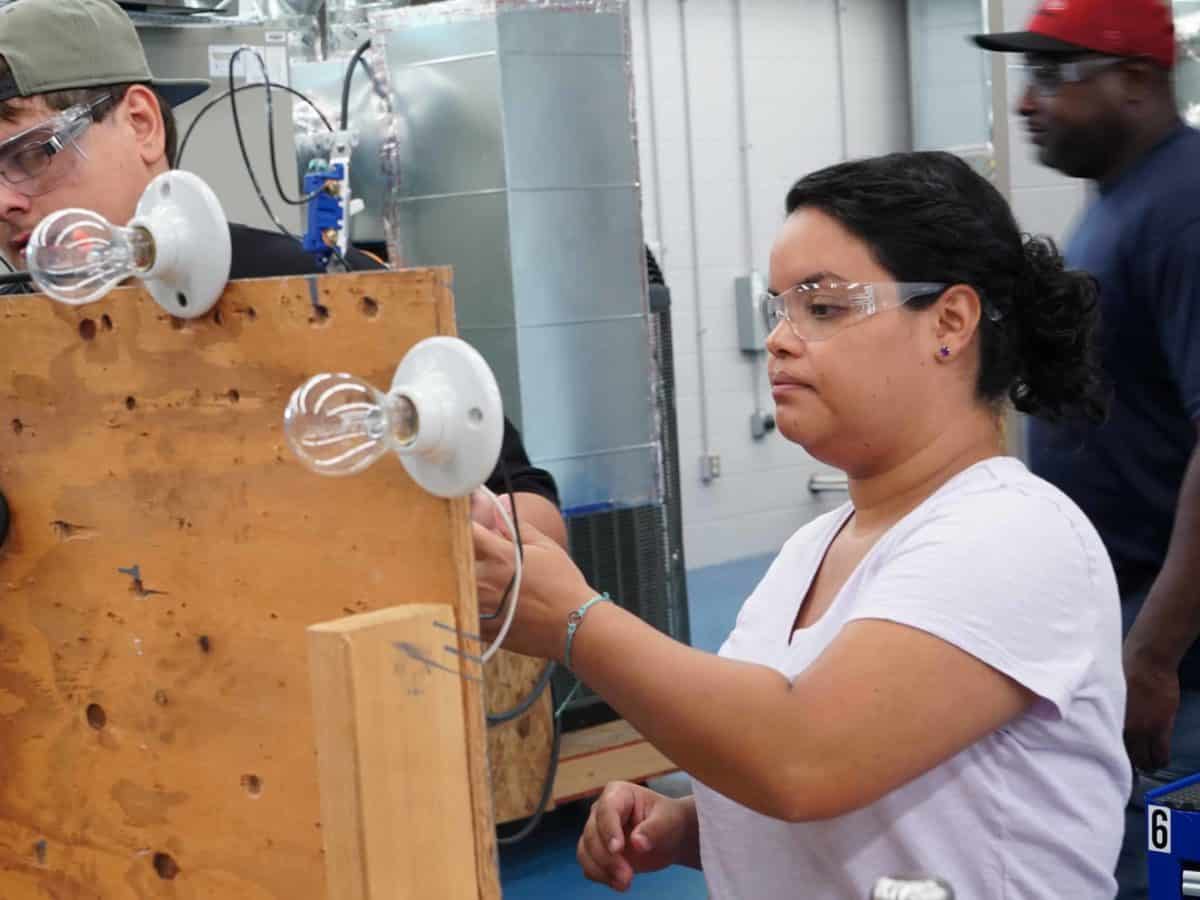
|
|
Nearly 5,000 students received a total of approximately $3 million in aid through the short-term workforce development grant program during the 2022-23 fiscal year, according to a legislative report approved by the State Board of Community Colleges March 15th.
Approximately 1,136 students have received $510,712.83 in aid during the 2023-24 fiscal year.
The General Assembly created the grant program in 2021 to promote student enrollment in high demand industries. Under the program, students pursuing short-term, noncredit state- and industry-recognized workforce credentials can receive up to $750. Federal financial aid is not available in these programs.
“The Short-Term Workforce Development Grant Program positively impacted community colleges in North Carolina,” the report says. “Students who might not otherwise have afforded educational and training programs were offered financial assistance for the first time. Beyond access, more students were given a valuable opportunity to gain new skills, improve their earning potential, and gain access to better career opportunities.”
Sign up for Awake58, our newsletter on all things community college.
In 2021, the General Assembly allocated $3 million in each year of the biennium toward the program. Last fall, the budget allocated $1 million toward the grant program, according to the North Carolina Community College System (NCCCS) report.
Grant funds help cover the cost of tuition, fees, books, supplies, credentialing tests, transportation, child care, “and any other components of the total cost of attendance,” the report says. To receive the grant, students must be residents of North Carolina and enrolled in workforce continuing education courses leading to a NC Workforce Credential identified as either “Essential” or “Career” level.
More than 1,800 credentials were awarded during the 2022-23 and 2023-24 fiscal years, the report says. During this time period, enrollment in workforce continuing education courses has also increased. Instructional Full-Time Equivalent (FTE) in workforce continuing education increased by 10.5% last fall, according to a release from the system.
“It’s incredibly exciting to see so many individuals choosing this accessible and affordable path to a brighter future,” NCCCS President Dr. Jeff Cox said in the release. “This is a win for students, businesses, and the entire state as we cultivate a skilled and prepared workforce.”
You can read the full report on the grant program here.
The Board also approved on Friday an allocation of $2,204,704 in high-cost workforce start up funding and $5,041,054 in high-cost workforce expansion funding “to support the start-up and expansion of healthcare workforce programs offered at NC community colleges.”
In 2023, the General Assembly appropriated $10 million in non-recurring funds to assist North Carolina community colleges in starting new programs in high-demand health care careers requiring significant start-up funds. The budget also allocated $10 million in non-recurring funds to expand courses and programs leading to a degree or credential in a health-care-related field.
The funding is available for both continuing education and curriculum courses and programs.
“The State of North Carolina is committed to ensuring the workforce needs of today and the future are being met,” the Board allocation document says. “Under this program, eligible colleges will receive start-up and/or expansion funding to support the implementation of new programs and course offerings. This allocation program will build capacity for workforce training in high-demand healthcare occupations where unmet employer demand exists.”
Finance Chair Lisa Estep said 53 of 58 community colleges submitted applications for the program.
“These are well utilized, and we thank the General Assembly for these funds,” Estep said.
Community colleges can only apply for the funds to support one new program in each pathway per year. There is a matching requirement for start-up funds, but not for expansion funding.
You can read more on the program and approved allocations here.
The Board’s discussions about workforce were reflected in the approval of a new vision statement for the Board:
The Vision for the NC Community College System: Elevating North Carolina’s future by delivering a diverse, highly skilled talent pipeline aligned to the labor market, supporting economic mobility that creates transformational generational change, and setting the national standard for innovation in higher education and workforce development.
NCCCS Vision Statement
“If we can live up to this vision, we will be giving our state exactly what it needs from this system,” Cox said.
The Board had an abbreviated March meeting due to the North Carolina Association of Community College Trustees law-legislative seminar. Here is a look at the other meeting items.
New Cooperative Innovative High Schools
There are 119 Cooperative Innovative High Schools (CIHS) in North Carolina, which include early colleges and STEM and career academies. CIHS students account for 31% of dual enrollment students in North Carolina.
The Board approved two new CIHS applications last Friday: Dare County Early College High School and Rockingham County CTE Innovation High School. The State Board of Education approved those applications earlier this month. The schools reflect the first CIHS program in Dare County and the second in Rockingham, respectively.
According to the application documents, Dare County Early College High School is set to open during the 2024-25 school year. Rockingham County CTE Innovation High School is set to open for the 2025-26 school year.
More on Cooperative Innovative High Schools



With those schools, there will be 121 CIHS programs in the state. During a statewide virtual dual enrollment conference last month, multiple speakers highlighted the large impact CIHS programs have on postsecondary attainment among participating students.
“This is one of the most important programs we do,” Board Member Sarah West said of the CIHS pathway.
There are CIHS programs at 57 of the state’s 58 community colleges, NCCCS’ Dr. Brian Merritt told the Board. Pamlico Community College is the only college with no CIHS program, he said.
“Typically this comes out of local assessments and local need,” said Merritt, the senior vice president and chief academic officer.
Both applicants received formal waivers to meet on other nearby campuses, West said, while appropriate facilities are prepared at the respective community colleges.
New college presidents, and HR action plan
The Board approved two new college presidents on Friday.
Dr. James “J.W.” Kelley, NCCCS’ current associate vice president of student services, was named as the next president of McDowell Technical Community College, effective July 1.
This comes after Merritt resigned from the role last summer to serve as a senior leader within the NCCCS.
“I am enormously grateful to the McDowell Technical Community College Board of Trustees and to members of the State Board of Community Colleges for giving me this opportunity to serve the citizens of McDowell County and Foothills Region of Western North Carolina as seventh president of McDowell Tech,” Kelley said. “The trust board members had in selecting me is an honor that I do not take lightly, and I look forward to earning their respect as I work with the wonderful faculty and staff at the college to continue our role as servant leaders in the place I will soon call ‘home.’”
Martin Community College named Dr. Tabitha Miller as its next college president. Since 2019, Miller has served as the vice president and chief academic officer at the college. She will begin in the role on May 1.
“I am honored to be chosen as MCC’s president and look forward to continuing my service to the students, faculty, and staff of MCC and the communities of Bertie and Martin Counties. Lifelong learning is the key to strengthening our communities,” Miller said.
The Board also heard an update from Cox on the system’s human resources (HR) assessment and action plan. The Board will receive a final audit report next month, he said. Here are some of the main components of the HR action plan Cox highlighted:
- Updating and completing required reports.
- Delivering monthly HR orientation session for hiring managers.
- Providing targeted management training and coaching.
- Implementing education credential verification software. This step is in the procurement process, Cox said.
- Updating onboarding process and HR policies.
- Evaluating HR staffing levels.
- Streamlining recruitment timelines and updating recruitment processes.
- Completing a comprehensive salary analysis.
- Updating job descriptions for all employees by this summer.
“This is going to be ongoing,” Cox said. “We’re going to continue to be analyzing and refining our processes here in HR until we are all happy with exactly where we are.”
Grant funding, reserve funds, and Propel NC
The Board continued discussion of its performance growth target for grant funding in the system.
The system’s year 1 goal is to apply for and raise $8 million in grant funding, per that draft document. The document lists a goal of $20 million for year 2 and $40 million by year 3. The system brought in approximately $5 million in grants in 2021 and 2022 and over $31 million in 2023.
In January, the Board announced a new director of grants to serve as a resource for grants within the system. That position was funded for one year.
Since then, that candidate withdrew their acceptance, Estep said.
The Board is now trying to figure out how to proceed, as multiple candidates mentioned hesitation in taking a one-year position.
Possible options include building funding for more than a year while contracting with grant writers in the meantime.
“This is a work in progress,” Estep said.
Chair Tom Looney asked if the Board is allowed to convert funds for a full-time grant director. He expressed worry that the process is moving too slowly and will leave a lot of current funding opportunities on the table.
“If this is a priority, we should treat it like a priority,” he said. “If it’s not, we should continue on the path we’re on.”
The Board also approved an allocation of $7,619,773 in enrollment growth reserve funds. That money will go to colleges who saw an enrollment increase greater than 5% of budgeted enrollment levels.
Last year was the first year in a long time that the system saw excess receipts overall, Estep said. This year, 50 colleges received funds. The majority of enrollment growth came from short-term and continuing education programs, she said.
You can view the list of colleges here.
Finally, the Board briefly discussed continuing to drive support for its proposed funding model, Propel NC, which received unanimous approval from the Board last month.
Under the proposed model, funding based on FTE will remain in place, but the current FTE tiers would shift to “workforce sectors.” The proposed sectors largely focus on health care, technology, and trades and will be ranked and valued by statewide salary job demand data every three years.
The system has received more than 150 letters of support for the model from business leaders, Cox said. Board members and system leaders will request consideration of Propel NC by the legislature during the short session in April.
“Propel NC is a dynamic and responsive change that allows us to meet the evolving needs of employers and get the next generation of workers ready for high-demand, good-paying jobs,” Looney said in a system release. “We need to take action now to ensure that our colleges continue to lead in delivering a skilled workforce essential for North Carolina’s ongoing economic development.”
The full Board meets next April 18-19.
Recommended reading




